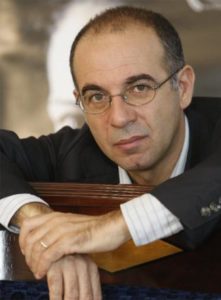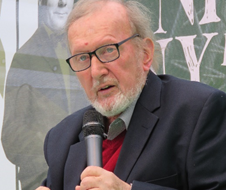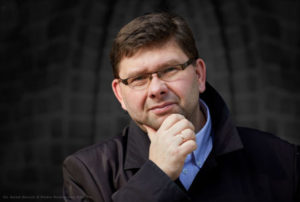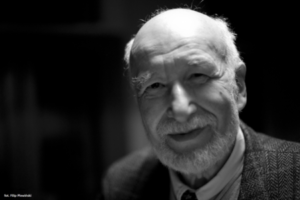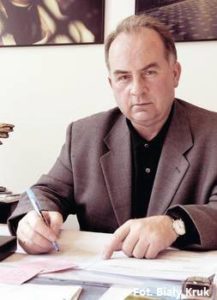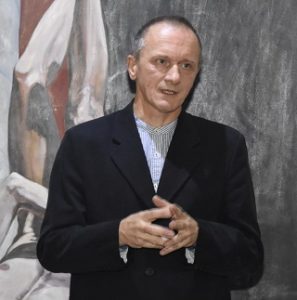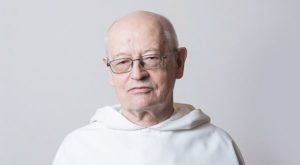The previous Per Artem Ad Deum award winners:
2022 – Giuseppe Tornatore is awarded for the Per Artem Ad Deum Medal for “for showing the truth, which is the emotional experience of the relationship with the Infinite and the Unknowable”
Italian director, screenwriter and film producer who originally comes from a small town near Palermo, Sicily. Having screened several films for RAI television in the 1979-1985 period, 1986 he made his first full-length feature film Il Camorrista (English: The Professor) with Ben Gazzara starring. This is when Tornatore was bestowed with the Nastro d’Argento award and the Italian Golden Globe for the best young director.
Tornatore’s second film turned out to be the turning point in his career; the nostalgic drama “Cinema Paradiso” with Philippe Noiret as one of the leads in the film. This film marks the onset of Tornatore’s collaboration with Ennio Morricone, the composer. “Cinema Paradiso” was awarded the Oscar for the best foreign-language film, as well as the Golden Globe, Felix, the British Academy of Film and Television (BAFTA) accolade and the Special Jury Prize at the Cannes Film Festival.
The third cinematic film directed by Giuseppe Tornatore – “Everyone’s Fine” gained him the Silver Ribbon for Best Original Screenplay and the OCIC Award in Cannes. In 1991, Tornatore was involved in the making of the “La Domenica Specialmente”, a collection of tales; his segment was called “Cane Blu”. Three years later, the creator of “Kino Paradiso” put his best foot forward by screening an intimate, metaphysical crime drama “Pure Formality”, written for two actors – Gerard Depardieu and Roman Polański.
The artist revisited the nostalgic atmosphere in his consecutive films; The Star Maker of 1995, The Legend of 1900 of 1998 and Malena starring Monica Bellucci. In addition, works such as “The Unknown Woman”, “Baaria” and “The Best Offer” are also steeped in a specific nostalgia.
The latest Giuseppe Tornatore’s film is the documentary “Ennio” of 2021, dedicated to the outstanding composer Ennio Morricone.
2021 – Ernest Bryll is awarded the Per Artem Ad Deum Medal for „poetry, that brings us closer to God and helps confront His absolute”
A graduate from the Faculty of Polish Philology at the University of Warsaw. He studied film sciences at the Film School in Łódź. As a journalist he collaborated with “Po Prostu”, “Sztandar Młodych”, “Współczesność”, “Miesięcznik Literacki”. His debut as a poet came in 1958 with Wigilie Wariata (Christmas Eves of a Lunatic); however, his poems in the “Non-unveiled face” (1963) collection made him truly famous.
Bryll also worked as the artistic head of Teatr Telewizji (Television Theater; 1967-1968), as well as the ‘Kamera’ film group (1967-68), and Teatr Polski (Polish Theatre in Warsaw; 1970-1974). From 1974 to 1978 Bryl held the position of the Polish Culture Institute director in London. Bryll also lectured at the Silesian University in Katowice (1978-1979) and became the artistic head of the Silesia film group in Katowice (1978-1983). In the years 1991-1995, he was the Polish ambassador to Ireland. Ernest Bryll is also a translator of Irish, Czech, and Yiddish, songwriter (Peggy Brown and A Te Skrzydła Połamane [And Those Broken Wings]) and the author of song and music performances that tap into folk and regional themes. The most popular folk and regional works include the ” Po górach, po chmurach [The mountains, the clouds]” pastorale, in the “Painted on glass” highlander-robber atmosphere poem. “Golgotha of Jasna Góra” – a series of poems influenced and inspired by the Mystery of the Passion and the Polish tradition of the Way of the Cross, containing fascinating images by Jerzy Duda-Gracz (a well-known painter, draftsman and set designer) can also be mentioned here. The passion-themed poem was made into an album of the same title. The poetry set to music featured famous Polish artists: Joanna Lewandowska and Marcin Stycznia. The project was awarded with the Phoenix in the category of Christian music. The “Wieczernik” [Cenacle] play, based on evangelical themes, was staged in churches all over Poland. The “I Nie proszę o wielkie znaki [I Am Not Asking for Great Signs]” and “Jezioro Kałuża [Puddle lake]” are genuine religious events, as they contain a collection of truths about the world God lost somewhere along the way.
Bryll was bestowed the Order of the Companion of the Royal House of O’Conor (1995), as well as the Commander’s Cross of the Order of Polonia Restituta (2006). He has also been presented many literary awards, including the Władysław Broniewski Award
for poetry and the City of Warsaw Award.
2020 – Paweł Łukaszewski – is awarded the Per Artem ad Deum Medal for “composing creativity and the quest for religious music essence”
He is a Polish composer, conductor, academic teacher and musical life animator. Łukaszewski is the laureate of numerous distinctions. In 2000 he was awarded the academic degree of Doctor of Fine Arts in Musical Composition, in 2006 a was awarded post-doctoral degree of Habilitated Doctor. Since December 2010, he has been a research and teaching professor. On 28 July 2014 President of the Republic of Poland nominated Łukaszewski a full professor of musical arts.
His works have been performed at over one hundred festivals at home and abroad, including England, Argentina, Belgium, Belarus, Chile, China, Czech Republic, Denmark, Estonia, France, Spain, Iceland, Israel, Canada, South Korea, Lithuania, Luxembourg, Malta, Mexico, Moldova, Monaco, Germany , Peru, Russia, Romania, Switzerland, Ukraine, Uruguay, USA, Vatican City and Italy. In the 2011/2012 artistic season, Paweł Łukaszewski is a resident-composer at the Warsaw National Philharmonic. Łukaszewski is also a member of the festivals’ artistic boards, including the International Festival of Sacred Music „Gaude Mater” in Częstochowa. He also sits on jury panels of composers’ competitions, including those in Arezzo, Moscow, Bucharest and Cologne. Łukaszewski is the “Musica Sacra” Warsaw-Praga Cathedral Choir director and the head of “Musica Sacra Edition” music publishing house.
Łukaszewski is regarded one of the most outstanding contemporary religious music composers. His work has been appreciated globally, the composer has been mainly recognised for composer’s creativity which features religions profoundness.
2020 – Jerzy Jan Skąpski – is awarded the Per Artem ad Deum Medal for “work which translates the vision into artistic forms”
He is a painter, graphic designer and stained glass designer, one of the most outstanding stained glass makers in Poland, he is also an eminent expert and admirer of religious art. His artistic interests also lie in easel and wall painting, posters and illustrations, however, stained glass designs is the priority. Jerzy Skąpski’s stained glass windows can be admired in Polish and foreign churches and chapels, including those in Sweden, Russia and France. In Poland, Jerzy Skąpski’s stained glass windows are found in the Warsaw Church of Divine Providence in Ochota, in the Church of Our Lady the Queen of Poland – the Lord’s Ark, in Gdynia’s Our Lady of Częstochowa Navy Garrison Church, in the Churches of Podhale, in the Saint Maximilian Church in Oświęcim, in the Saint Pius Church in Ruda Śląska, in the Holy Cross Church in Zakopane, in the chapel of the prison in Montelupich Street in Krakow and many other – there is over 300 works in total.
Jerzy Skąpski is the author of Europe’s largest stained glass window – this is a triangular image of 177 square meters, 18.5 meters in height. The stained glass window is mounted in St. Adalbert’s Church’s front glass wall of the temple, with Saint Adalbert as the main figure. The saint wearing an episcopal tiara holds an oar in one hand and a cross in the other.
2020 – Leszek Sosnowski – is awarded the Per Artem ad Deum Medal for “Polish literature development enhancement, with the particular recognition for his publication of a multi-volume series of books presenting St. John Paul II Pontificate history”.
Leszek Sosnowski won 57 Polish and international awards, and among them the European Leader Awad 2005, Totus Award 2011, Pro Patria Medal 2017, Knight’s Cross of the Order of Merit of the Republic of Poland 2018.
In 1996, he founded the “Biały Kruk” publishing house; Saint. Pope John Paul II has been the first author published by Biały Kruk. This publishing company is the undisputed Polish book market leader in albums, for many years it has promoted and propagated domestic and global arts and traditions. Numerous publications on religious, patriotic and cultural matters serve as a wonderful show-piece of Poland, its history and centuries of its rich spiritual and material heritage. Leszek Sosnowski’s genuine project – “Land of Benedict XVI” album was published in two language versions.
In 2002 the White Kruk publishing house was expanded to include the Film Studio. This is where feature-length documentaries are produced, including ‘God’s Friend’ with Leszek Sosnowski as the chief screenwriter. In 2004, the film received the Niepokalanów festival Grand Prix in the feature film category. The publisher was highly valued by Saint John Paul II who appointed the Biały Kruk the exclusive publish of his “Renaissance Psalter” poems collection.
Leszek Sosnowski has been the editor of over 150 books devoted to Saint John Paul II, including the 27-volume series “History of John Paul II Pontificate”. Sosnowski also created 400 editorial concepts and graphic designs for books published by the Biały Kruk.
2019 – Marcin Bornus-Szczyciński is awarded the Per Artem ad Deum Medal for “tradition promotion and dissemination, for creating the space where spiritual and secular element are brought together”
He is one of the pioneers among Poland’s baroque music vocalists, a founder of the Bornus Consort ensemble. A graduate of the Economic Sciences Faculty at the University of Warsaw, for four years he worked as an assistant lecturer at the Faculty of Management at the University of Warsaw. Then he opted for a career change and resolved to work as freelance musician.
In 1986 he was awarded the French government scholarship to complete a master’s course at the Paris Conservatory. The founder of the Bornus Consort (1981) ensemble – Poland’s first attempt to reconstruct the genuine sound of a male chamber vocal ensemble with its specific vocal techniques.
The ensemble specialises in Polish polyphony characteristic for the turn of 16th and 17th centuries. He recorded for Polish Radioin additions to the works long-plays with works of Bartłomiej Pękiel, Piotr from Grudziądz, Mikołaj Zieleński, Marcin Mielczewski, all works of Wacław from Szamotuły, Polish Lent songs, chants about Saint Wojciech, Chansons et Motets, Media vita, et al.
He has performed in most European countries. Recently, he has been solely devoted to monody, especially liturgical monody. He calls himself a “traditionalist” rather than a musician as he has been into recognition, preservation and dissemination of various local traditions.
2019 – Tadeusz Boruta is presented the Per Artem ad Deum Medal for “creativity which spurs today’s man search for an individual relationship with God”
A painter and arts critic born in Krakow, from 1979 to 1983 Boruta studied painting at the Fine Arts Academy in Krakow and received his diploma at Stanislaw Rodziński’s and Zbylut Grzywacz’s workshop.
At the same time, in 1980 he also began philosophical studies at the Pontifical Academy of Theology in Kracow and graduated four years later. His painting often encompass religious themes, including Passion of Christ. In the 1980s, he was a part of the independent culture movement. In 1984 awarded the “Solidarity” Independent Culture Committee’s accolades at the “Around the Graphics” exhibition. In 1985 he won the 1st Prize at the First National Youth Biennale “The Way and the Truth”. In 1988 he was bestowed the Young Artistic Prize for 1987’s achievements.
He is the author of several problem-focussed exhibitions, including “Towards the Person” (1985), “All our Daily Things” (1987) in showcased in the cloisters of Dominicans Monastery in Krakow, the “Paschal Mystery” (1986) in the crypt of the Piarists church in Krakow, “Aus der Metapher heraus” (1990) in Darmstadt, “What is an artist worth in the times of misery” (1990) in Warsaw Zachęta galery and the National Museum in Krakow (1991), “I barbari nel giardino.
Mostra di pittura di artisti polacchi “in Bologna (1998),” Generation ’80. Independent young artists’ works in the 1980-1989 period” in Krakow (2010).
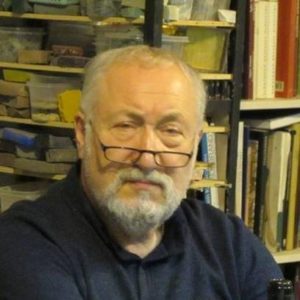 2019 – Alexander Kornoukhov is presented the Per Artem ad Deum Medal for “fusion of science and tradition expressed inspired art forms”
2019 – Alexander Kornoukhov is presented the Per Artem ad Deum Medal for “fusion of science and tradition expressed inspired art forms”
The most prominent present-day mosaicist, open to other religions and cultures as evidenced by his realizations in churches of different denominations.
The studios he works in are located studios in Moscow, Georgia, Ravenna and Rome. A laureate of many prestigious awards, world competitions including those in Ravenna (Italy) in 1986, the Golden Medal of the Russian Academy of Artists (2002).
The arrangement of the New Jerusalem mosaic made of 100 million elements in the Vatican chapel is his most famous achievement. The project is ranked among one of the most ambitious artistic undertakings of the 20th century.
2018 – Professor Jan Andrzej Kłoczowski is a Dominican, a theologian, a professor of philosophy who has been decorated with the Commander’s Cross of the Order of Polonia Restituta. Kłoczowski he graduated from the Institute of Art History of Adam Mickiewicz University in Poznan and philosophy at the Catholic University of Lublin. He teaches philosophy of God and religion as well as the 19th and 20th century philosophy history at the College of Philosophy and Theology of the Dominicans in Krakow. He was also the Department of Philosophy of Religion head at the Faculty of Philosophy of the Pontifical University of John Paul II in Krakow. Kłoczowski is also the books author, and amon them “More than a myth. Leszek Kołakowski’s dispute over religion “,” Between loneliness and community. Introduction to philosophy of religion “,” Man’s ways of mysticism”,” Philosophy of dialogue “. Kłoczowski is the chairman of the Program Board of the Józef Tischner Institute . In 2014 Kłoczowski received the title of Master of Sacred Theology – the highest Dominican academic title. In the 1970’s and 1980’s Fr. Kłoczowski was involved in the Dominican “Beczka” pastoral ministry, he was also actively involved in anti-communist opposition, including through the Student Solidarity Committee). In 2015 the “Kłocz. Autobiography” book was out – this is the interview with Father Kłoczowski authored by Artur Sporniak and Jan Strzałka.
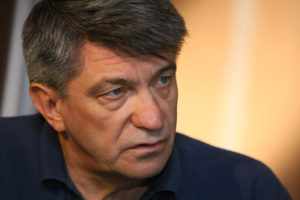 2018 – Aleksander Sokurov – a Russian director and screenwriter, the winner of the Golden Lion at the 68th Venice International Film Festival for his adaptation of the Faust. By the resolution of the European Film Academy, Sokurov was pronounced one of the 100 best directors. Aleksander Sokurov graduated from the Faculty of History at the University of Gorky. In the years 1975-1979 Sokurov studied at the Moscow’s WGIK famous film school, the documentary film studio. He did not finish his studies as he was accused of anti-Soviet political views. Sokurov worked in “Leningrad” documentary film studios. He eventually gained recognition in the 90’s. He lectured at the LenFilm Studio and hosted his own TV program “Sokurov’s Island”. In Saint Petersburg Sokurov opened a film production company “Bereg” whose objective was to support independent artists. Starting from “Moloch”, none of Sokurov’s films has gone unnoticed. Almost all his films have competed at the Cannes’ IFF main competition for the Golden Palm. In 2003 he was also honoured with the Andrzej Wajda “Freedom” Award presented by the American Cinema Foundation.
2018 – Aleksander Sokurov – a Russian director and screenwriter, the winner of the Golden Lion at the 68th Venice International Film Festival for his adaptation of the Faust. By the resolution of the European Film Academy, Sokurov was pronounced one of the 100 best directors. Aleksander Sokurov graduated from the Faculty of History at the University of Gorky. In the years 1975-1979 Sokurov studied at the Moscow’s WGIK famous film school, the documentary film studio. He did not finish his studies as he was accused of anti-Soviet political views. Sokurov worked in “Leningrad” documentary film studios. He eventually gained recognition in the 90’s. He lectured at the LenFilm Studio and hosted his own TV program “Sokurov’s Island”. In Saint Petersburg Sokurov opened a film production company “Bereg” whose objective was to support independent artists. Starting from “Moloch”, none of Sokurov’s films has gone unnoticed. Almost all his films have competed at the Cannes’ IFF main competition for the Golden Palm. In 2003 he was also honoured with the Andrzej Wajda “Freedom” Award presented by the American Cinema Foundation.
 2017 – Claudia Henzler Salzburg based artist-photographer who has visited the most remote corners of the world. Through her full-of-passion photographs, peoples’ stories become immortalised. Mrs Henzler is bestowed with the extraordinary gift of capturing images which deeply move the soul. Her carefully woven “images tapestries” skilfully draw from a variety of elements in different cultures; these elements are combined and blended into a common thread – humanity.
2017 – Claudia Henzler Salzburg based artist-photographer who has visited the most remote corners of the world. Through her full-of-passion photographs, peoples’ stories become immortalised. Mrs Henzler is bestowed with the extraordinary gift of capturing images which deeply move the soul. Her carefully woven “images tapestries” skilfully draw from a variety of elements in different cultures; these elements are combined and blended into a common thread – humanity.
Photographic exhibitions
“MOZART & THE LONELY HORSE”, “Wohin – Quo Vadis,” “Salzburger Festspiele 2014”
“Srebrenica”, “FACES OF KOSOVO”, “Terra Sancta – In Search for Peace”, “ROMANIA SACRA – In Touch with the Essence of Life”, “HAITI – UNDER MY SKIN” [HAITI – under the skin], “THE SPLENDOR OF TRUTH. THE BEAUTY OF CHARITY”, “Gerechtigkeit schafft Frieden”, “Menschenwiirde contra Zynismus”, “Faces of Georgia”, “Assisi – Culture & Sprituality”, “Antlitz der Gegenwart”, “Our Saints”, “REALITIES”.
JOURNALISM
Stern Group, (Germany), Mediaprint (Austria), Mediengruppe „Osterreich” GmbH (Austria), Der Standard (Austria), Heute (Austria), Presse (Austria), San Mateo County Times (USA)
 2017 – Professor Michał Kazimierz Heller – a catholic priest, theologian, professor of theology who specialises in natural philosophy and physics, relativistic cosmology and science-faith relations. The laureate of Templeton Prize, also bestowed with the White Eagle Order. The director, founder and originator of the Copernicus Centre for Interdisciplinary Studies.
2017 – Professor Michał Kazimierz Heller – a catholic priest, theologian, professor of theology who specialises in natural philosophy and physics, relativistic cosmology and science-faith relations. The laureate of Templeton Prize, also bestowed with the White Eagle Order. The director, founder and originator of the Copernicus Centre for Interdisciplinary Studies.
After the World War II outbreak, the Hellers family fled to Lvov. In 1940 the family was expelled by Soviet authorities and sent to exile to eastern Siberia – Yakutia, the place of poverty and hunger. In 1944 they were relocated to the south of Russia, near the Volga’s Urbach, Saratov. After returning to the Poland (1946), Heller entered IV High School in Tarnow, graduation – 1953.
Michał Heller graduated the Seminary in Tarnow, where he later lectured. He was also the first dean of the Faculty of Theology in Tarnów. Heller was ordained on 26 April 1959 by the Bishop Karol Pękala and appointed a vicar in Ropczyce. Father Heller continued studies at the Faculty of Philosophy of the Catholic University of Lublin where in 1966 he received the doctoral degree in relativistic cosmology . In 1969 he received post-doctoral habilitation.
In 1990 Father Heller was appointed to the rank of the full professor of the Pontifical Academy of Theology; in 2009 the Academy was transformed into the Pontifical University of John Paul II. Together with Fr Józef Życiński, Heller founded the Centre for Interdisciplinary Research and became its director. Fr. Heller participated in academic programs at the Belgian Louvain-la-Neuve university, Oxford and Leicester university (England), the Bochum university (Germany) and Catholic University of America in Washington (USA).
Fr. Heller works in the Vatican Astronomical Observatory , since 1990 he has been a member of the Pontifical Academy of Sciences. In 2008 Heller was the first Pole to be awarded Templeton Prize in recognition of advancing dialogue between science and religion. With this award Heller was the founder and director of Copernicus Centre for Interdisciplinary Studies (UPJP2-UJ), – the Copernicus Centre Press operates under the umbrella of the Centre.
 2017 – Professor Tomáš Halík – a Czech catholic priest, a philosopher, a psychologist and theologian who has worked as, inter alia a university minister and lecturer at Prague’s Charles University. The author of several theological books. Professor, with senior PhD degree in sociology and theology, PhD in philosophy.
2017 – Professor Tomáš Halík – a Czech catholic priest, a philosopher, a psychologist and theologian who has worked as, inter alia a university minister and lecturer at Prague’s Charles University. The author of several theological books. Professor, with senior PhD degree in sociology and theology, PhD in philosophy.
A graduate of sociology and philosophy at the of Prague’s Charles University Philosophical Faculty, a disciple of Jan Patočka. The communist authorities refused the right to lecture at the university; Halik received a job placement as an environmental psychotherapist among alcoholics and drug addicts.
On 21 October 1978 he was secretly ordained a catholic priest by the Bishop of Erfurt. Until 1989 Halik was one of the most important personages in the underground Catholic Church, a close collaborator of Cardinal František Tomášek.
Since 1990 he had been the rector of the Church of the Holy Saviour in Prague and the president of the Czech Christian Academy (after the death of the Academy founder – Fr. Josef Zvěřiny). In the same year pope John Paul II appointed Fr Halik a consultant to the Pontifical Council for Dialogue with Non-Believers where he worked for two years. Since 1993 he has lectured religious studies at the Charles University Philosophical Faculty. Fr Halik also lectured at Oxford and Cambridge, he was a member president Václav Havel’s experts panel.
In 2008 he was appointed by Pope Benedict XVI the Honorary Prelate of His Holiness.
He is known for his involvement in social life, for his public statements on racial discrimination issues, on political and religious issues and the process of European integration and secularization.
2016 – Arnaldo Pomodoro – an Italian sculptor and goldsmith.
Pomodoro is the world-renowned, greatest Italian contemporary sculptor. His works adorn the towns of Sorrento, Rimini, Pesaro, Rome, Milan, Turin, Tivoli, Belluno, Copenhagen, Brisbane, Dublin, Los Angeles and many other. Pomodoro’s sculptures are parts of permanent exhibitions of the world’s largest museums. Since 1954 Pomodoro has lived and worked in Milan.
2016 – Arvo Pärt – Estonian composer of choral and instrumental music. He has been bestowed, inter alia, the Great Cultural Award of the Estonian Association in Stockholm (1983) and the Herder Prize awarded by the University of Vienna (2000). In 2009, the “In Principio” record with Pärt’s compositions of 1989-2005 period was released. One of the works – Cecilia, Vergine Romana was first presented in Turin for the occasion of the 2006’s Olympic Games. Pärt’s most recent release is the “Adam’s Lament” album (ECM, 2012).
 2016 – Antonina Krzysztoń – Polish singer, composer and songwriter. She made her début in 1980 at the Forbidden Song Festival staged in Gdansk’s Olivia Hall. For many years she worked with the two musicians – Słoma (percussion) and Kuba (bass), the cooperation bore a fruit in the form of two long-plays ” Kiedy orzyjdzie dzień [When the Day Comes]” and “Pieśni Wielkopostne Wołanie [Lent Songs]”. Antonina plays many concerts, many of them are staged in churches. Although her songs clearly define and express the world-views, her songs appeal to people of different beliefs. Not only is Antonina the music creator of most of the songs, but she is also a songwriter. She wrote songs for Mietk Szcześniak, Michał Lorenc as well as lyrics to Wojciech Konikiewicz’s music.
2016 – Antonina Krzysztoń – Polish singer, composer and songwriter. She made her début in 1980 at the Forbidden Song Festival staged in Gdansk’s Olivia Hall. For many years she worked with the two musicians – Słoma (percussion) and Kuba (bass), the cooperation bore a fruit in the form of two long-plays ” Kiedy orzyjdzie dzień [When the Day Comes]” and “Pieśni Wielkopostne Wołanie [Lent Songs]”. Antonina plays many concerts, many of them are staged in churches. Although her songs clearly define and express the world-views, her songs appeal to people of different beliefs. Not only is Antonina the music creator of most of the songs, but she is also a songwriter. She wrote songs for Mietk Szcześniak, Michał Lorenc as well as lyrics to Wojciech Konikiewicz’s music.
2014 – Adam Bujak – is a world-famous artist-photographer; since the ’60s he has documented Pope John Paul II’s pastoral ministry. Bujak is the author of over a hundred photo albums, posters and calendars. There is no other artist who can paint with light and thus show the works of art beauty. Bujak has collaborated with the “Tygodnik Powszechny” and Krakow Television. One of Bujak’s most famous exhibitions – “John Paul II’s Krakow” will be staged at the Targi Kielce’s SACROEXPO.
2014 – Mario Botta – the Swiss architect.By the Chapter’s resolution, the distinction has been awarded for:”… indefatigable quest in the search of the Form – concurrently human and divine, which would reconcile the reality with the Idea …”. You love the church, because this is the place you can experience the creator. Upon entering a church building, you feel that you are in the centre of the world- said Mario Botta – the Swiss architect .Mario Botta – one of the architecture-world’s big and easily recognisable names. His buildings, at the times when church architecture often becomes a display of technical capabilities, are the sanctuaries of silence, recollection and prayer. His work serve as the proof that the church building is the heart of the city, regardless the religion; adds the artist. Among the examples of Mario Botta’s works there are: John the Baptist Church in Mogno, Cathedral of the Resurrection in Evry, Church of Santo Volto in Turin, the Chapel of Monte Tamaro and the Church of the Blessed Odoric in Pordenone.
2013 – Stanisław Rodziński (born 1940), a painter and an essayist. A master of colour and chiaroscuro. A graduate of Fine Arts Academy ASP in Krakow (1963). In the years 1972-1981 Rodziński was the head of painting and drawing workshop at the Academy of Fine Arts in Wroclaw. Since 1981 he has been professionally associated with the Academy of Fine Arts in Krakow. Since 1989 associate professor, since 1992 a full professor. In the years 1991-1992 Rodziński was a member of the Council for Culture at the Prime Minister of Poland’s office. Dean of the Faculty of Painting at the Academy of Fine Arts in 1993-1996. 1996 and 2002 – the Rector. A member of PAU and the Programme Council of the Institute of National Heritage (since 2001). Numerous group exhibitions as well as authorial exhibitions in Europe and the USA. His paintings are in great demand with the public; owing to the ever growing interest in the oil paintings of the masterful of colour handling. Winner of numerous awards (including the Foundation Jurzykowski accolades), bestowed the Medal of the National Education Commission (1993) and the Officer’s Cross of the Order of the Rebirth of Poland (1998), an honorary doctorate from the University of Wroclaw (2002).
2012 – Stefan Stuligrosz – Founder of the Pzonan Nightingales Choir, a charismatic artist and a great teacher.
Professor Stuligrosz, in addition to Poznań Nightingales, also periodically directed the Stanislaw Moniuszko Mixed Choir in Poznań, the Men’s “Echo” Choir of Poznan University of Technology. A demon for work and a true artistic aficionado – in 1953-1963 Stuligrosz was also the manager of Music Division at the Polish Radio in Poznań as well as the Chairman of the Henryk Wieniawski Poznan Music Society in 1971-90. Stuligrosz composed almost 600 choir works – a cappella and accompanied by the piano, the organ and the orchestra. He also adapted dozens of Christmas carols and songs.
2012 – Ennio Morricone – the world-famous composer, creator of the brilliant film music.
World fame is owed to his soundtrack for “The Mission” in 1986. Since then he has collaborated with many famous filmmakers such as: Pedro Almodovar, Oliver Stone, Mike Nichols and Brian de Palma. Morricone also developed interests in classical music – he is the author of such compositions as: “Cantata Frammenti di Eros” and “Cantata per l’Europa”.
2011 – Stanisław Niemczyk – known as the “Polish Gaudi”, the creator of exceptional churches. Niemczyk has also been awarded with the Honorary Award of the Polish Association of Architects and the with the Pro Eclesia et Pontifice distinction by Pope John Paul II. The two most famous realisations of Niemczyk are the Church of Jesus the Saviour in Czechowice-Dziedzice (1995-1998, one of the icons of Polish architecture) and the Holy Spirit Church, the tent-shaped temple in Tychy (1979-1983). Tychy is the place where another unusual project has been carried out since 2000 – the Franciscan church and monastery assembly.

The laureate of the Per Artem ad Deum medal – Krzysztof Zanussi and Targi Kielce President of Board Andrzej Mochoń PhD
2010 – Krzysztof Zanussi – film and theatre director and scriptwriter, a member of the European Film Academy. Since 1997 a member of the Pontifical Academy of Fine Art and Letters. Zanussi was nominated for the Golden Globe Award for his film A Year of the Quiet Sun. He was also the laureate of the Lumière Award awarded by the Italian Society of Theatre and Film Authors for lifetime achievement in the field of film.
2009 – Wojciech Kilar – a world famous composer pianist and film music creator; the laureate of numerous international awards, including the award for the music composed for Francis Ford Coppola’s Bram Stoker’s Dracula and also the American Society of Composers, Authors and Publishers’ “ASCAP Award 1992”.
2008 – Leszek Mądzik – a theatre scenographer and director. Mądzik cooperates with a number of theatres and drama schools in Poland and abroad. Mądzik was honoured with the Medal for Merit to Culture Gloria Artis. The author of the “Żar” (Embers/Passion) spectacle which was realised in Portugal and the phenomenal Lublin performance of “Przejście” (Transition).
2007 – Stanisław Słonina – a sculptor, modelling clay artist and graphic artist. Słonina presents his works at exhibitions held at home and abroad; he is also a laureate of numerous artistic awards, including the UNESCO Grand Prix and the Gold Medal of the Parliament of Argentina. Słonina is the creator of the John Paul II monument in Buenos Aires. Słonina’s works of art can be found in Poland’s leading museums. Słonina is a sculpture professor at Warsaw Academy of Fine Arts.
2006 – Dobrosław Bagiński – the sculptor and designer, lecturer at the Faculty of Arts at Maria Curie-Skłodowska University and also at Lublin University of Technology. Since 1983 Bagiński has been a sacral art creator and has dealt in sacral art theory. The Andrzej Bobola church in Lublin, the church Our Lady the Queen of Poland (in the Tatra Mountains), the church in Jakubowice and the 1987 Papal altar in Lublin are described as Bagiński’s greatest successes.
2005 – The “Furdyna” stained-glass workshop from Krakow – We realise 150 projects for sacral and secular building all over Poland and also abroad including Germany, Great Britain, Ukraine, the USA and even Tasmania. In addition to stained production we also deal in the conservation of historic stained glass windows in Poland and other European countries.

